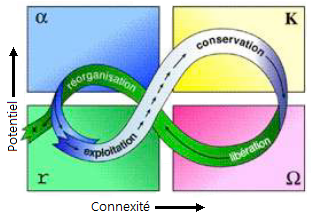Panarchie
Glossaries
| Term | Definition |
|---|---|
| Panarchie | ♦ Terme utilisé pour définir un modèle de systèmes hiérarchiquement liés et représentés comme des cycles adaptatifs qui interagissent à différentes échelles. Le cycle de panarchie illustre les quatre stades d’évolution d’une situation : exploitation, conservation, dégagement et réorganisation. > Chacun des stades du cycle de panarchie est une phase distincte, avec sa dynamique propre. Caractérisée par l’essai-erreur, la réorganisation est une phase exploratoire qui peut sembler chaotique et aléatoire. C’est seulement quand les idées se cristallisent que peut s’amorcer une phase plus ordonnée et prévisible, l’exploitation. L’exploitation – ou phase entrepreneuriale – transforme l’invention en action. Au fur et à mesure que s’approfondit la connaissance de l’invention, on découvre des améliorations, et le modèle passe au stade de la maturité, ou conservation. Pour réaliser les améliorations, on engage divers types de capitaux – ressources, connaissances et processus. Comme les améliorations sont forcément liées à un contexte donné – un moment ou un environnement précis, par exemple, leur pertinence varie selon les changements qui surviennent. Il faut dégager une partie du capital pour le réassembler de manière plus appropriée dans le nouveau contexte.
Source : http://www.appartenance-belonging.org/fr/ressources/lecycledepanarchie ♦ Équivalent étranger : Panarchy. |



